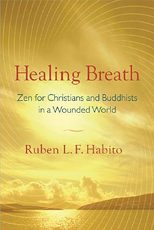"Zen is a form of spiritual practice, a way of life, and a vision of reality that not only can launch us in our inner work of personal healing, but also at the same time enhance and intensify our engagement in tasks of global healing," writes Ruben L. F. Habito, a former Jesuit priest, who served in Japan under the guidance of the great spiritual pioneer Father Hugo Enomiya-Lassalle and studied Zen with renowned teacher Kourn Yamada. The author of Living Zen, Loving God, he is a prominent figure in Buddhist-Christian dialogue. He teaches at the Perkins School of Theology at Southern Methodist University.
Habito believes that Zen offers an antidote to the woundedness of our times, which are characterized by a fear of the natural world as other, widespread alienation and violence in society, and a tendency to see ourselves as separate from our neighbors. Zen opens us to a new way of seeing and being with its emphasis upon direct transmission outside Scriptures, its refusal to rely on words or letters, its relationship to the core of our being, and its message about awakening to our true nature. Habito examines this path as "the art of living in attunement with the Breath" and then goes on to discuss the elements of sitting meditation. Zen affirms the art of simply being, the miracle of the body, and an appreciation of the everyday wonders of life.
In a robust chapter near the end of the book, Habito lays out the ways in which Zen practice can lead to a six-point recovery program of our true, integral self: it includes a recovering of the now, the body, our shadow, the feminine, the wonder in nature, and reconnecting with the neighbor. The author makes a convincing case that Zen has resonances with Christianity and that the two together can offer a spirituality of engagement for a postmodern world.
